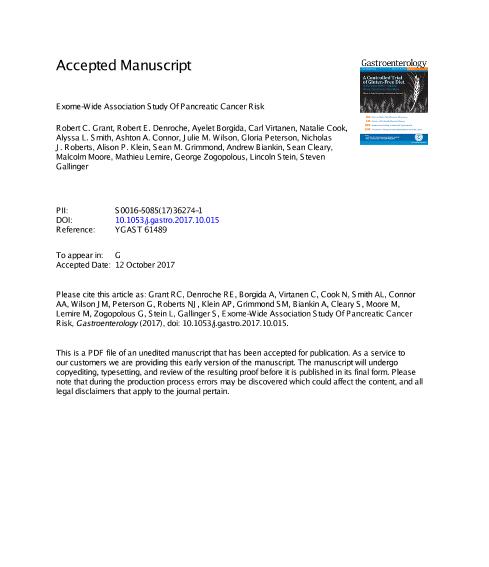Exome-Wide Association Study of Pancreatic Cancer Risk
摘要:We conducted a case-control exome-wide association study to discover germline variants in coding regions that affect risk for pancreatic cancer, combining data from 5 studies. We analyzed exome and genome sequencing data from 437 patients with pancreatic cancer (cases) and 1922 individuals not known to have cancer (controls). In the primary analysis, BRCA2 had the strongest enrichment for rare inactivating variants (17/437 cases vs 3/1922 controls) (P = 3.27x10–6; exome-wide statistical significance threshold P < 2.5x10–6). Cases had more rare inactivating variants in DNA repair genes than controls, even after excluding 13 genes known to predispose to pancreatic cancer (adjusted odds ratio, 1.35; P = .045). At the suggestive threshold (P < .001), 6 genes were enriched for rare damaging variants (UHMK1, AP1G2, DNTA, CHST6, FGFR3, and EPHA1) and 7 genes had associations with pancreatic cancer risk, based on the sequence-kernel association test. We confirmed variants in BRCA2 as the most common high-penetrant genetic factor associated with pancreatic cancer and we also identified candidate pancreatic cancer genes. Large collaborations and novel approaches are needed to overcome the genetic heterogeneity of pancreatic cancer predisposition.
关键词:
论文方向:[{"id":912,"name":"肿瘤学"}]
发表期刊:Gastroenterology Volume 154, Issue 3
发表时间:Wed Feb 28 00:00:00 CST 2018
数字识别码:10.1053/j.gastro.2017.10.015
是否作者本人: 否
版权及免责声明:
本网站所有论文文件均系用户自行上传或提供,本网站对其内容准确性及合法性概不负责,亦不承担任何法律责任。论文版权归原作者及原出处所有。
如您发现网站其他用户上传的论文有侵犯您的姓名权、隐私权、著作权或其他合法权益现象的,请及时与本网站联系并附加相关权利证明文件,以便本网站及时作出处理,维护您的合法权益。
本网站拥有对此声明的最终解释权。






{replyUser1} 回复 {replyUser2}:{content}